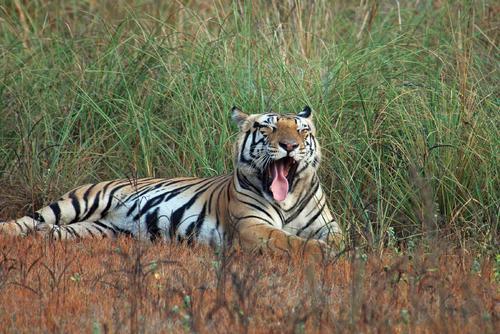This project is situated inside the world-renowned Kanha National Park, famous for being one of the best locations to witness Bengal tigers in the world. This National Park is home to an incredible blend of forest, meadows and open water that actually provided Rudyard Kipling with the inspiration for the Jungle Book! As well as the large tiger population that is resident here, the area is also home to a myriad of bird species, leopards and many other animals!
In addition to walking and vehicle-based safaris, you will take part in a variety of tiger conservation activities, community focussed initiatives and wildlife management during your time on the project. This could include tasks such as setting up camera traps, learning how to identify animal tracks, educational talks, helping to teach at a local school and meeting the local people to exchange cultures.
There are a lot of amazing activities to look forward to on this project, so what are you waiting for?
Itinerary
Day 1
After arriving at New Delhi’s Indira Gandhi International Airport, meet the project staff and transfer to your hotel. Once checked in, take the chance to relax, or explore Delhi and all of its cultural gems.
Day 2
After breakfast at your hotel, fly to Jabalpur. Transfer to the species-rich haven of Kanha National Park, before settling in at Kipling Camp and enjoying a welcoming lunch.
Help the Naturalist install camera traps, learn conservation techniques, and hopefully photograph some wildlife action!
After this you'll join the Kanha Field Officer of Wildlife Protection in his work before enjoying the rest of the evening at leisure.
Day 3
Embark on your first jungle safari, then pay a visit to a local school, watching a class take place and experiencing the impact of volunteering. Teach the local children about wildlife and the importance of environment conversation and later watch the talented Baiga Tribe perform a dance for your group. Enjoy a candle-lit dinner before retiring to your beds in preparation for the next days activities.
Day 4
Take a tour of local villages (season dependent for private trips), getting to know local residents and taking part in local crafts or harvest. Enjoy a picnic lunch away from the park. Venture out to a safari and soak in the beautiful landscapes of Kanha, and its vast array of wildlife.
Head to the training centre to watch an informative wildlife film, either created by or starring conservationist Belinda Wright and then end the night with a campfire dinner outside of Bamboo House.
Day 5
Start the morning with another safari. Take part in after-lunch art classes with the local Gond artists, learning the basic techniques of Gond arts and the inspiration behind the paintings. Later you'll join the Kanha Field Officer of WPSI in his work, visiting a forest village and teaching the villagers about conservation, helpful government schemes, and the anti-poaching policy.
Day 6
Trek on a nature trail within Kanha Tiger Reserve, taking opportunity to bird watch and learn how to track and sign difference species of wildlife. Enjoy lunch at the Lodge before heading out for an afternoon safari. Say farewell to camp Kipling by having dinner around a campfire outside Bamboo House.
Day 7
Leave for the Chitvan Jungle Lodge, located approximately an hour’s journey away on the other side of the camp . You will take part in an orientation before visiting the Corbett Foundation, an organisation which works for the local communities distributing solar lanterns and offering health care among other things.
Pay a visit to the Tribal Museum for a guided tour to learn a little more about the local culture. You will then finish the day by watching the Wildlife Film Show and partake in discussions with experts about the issues faced in tiger conservation.
Day 8
Head out on a morning safari to the Mukki Zone of Kanha National Park and then take part in an orientation of organic farms in Chitvan, discovering the concept of solar cooking, rain water harvesting and other such activities which help to reduce both carbon and water footprints.
Enjoy evening drinks and dinner with the field director of the Wildlife Protection Society of India, with further discussions on Tiger Conservation.
Day 9
After breakfast, visit the local school and begin to understand the education patterns and routines. You'll get the chance to educate the children about their role in maintaining the ecosystem, and the importance of wildlife conservation. Join an evening safari in the Mukki zone of Kanha.
Day 10
Venture out on a new safari in the Kisli zone of Kanha before taking the afternoon to visit the buffer zone to learn the process of tiger census, setting of camera traps, and the old pugmark tracing method of census' with a wildlife biologist/forest official.
Day 11
Visit the Baiga village and start to understand the local’s concerns regarding man-made animal conflict, their dependence on the forest, and how to work in their fields. Pay a visit to the local Aanganwadi, a nursery school in the nearby village. Finish the evening by going on a safari in the Mukki zone.
Day 12
After breakfast, leave for Jabalapur Airport (packed lunch in hand!) to catch the flight back to Delhi. On the way back to Jabalpur, stop briefly at the WWF centre and learn all about the activities and community work done by WWF in this particular landscape.
Day 13 Spend your final day admiring Delhi itself, before saying a fond farewell and either heading back to the airport for your flight home, or to commence your onward travel plans.



